Information/Write-up
With the release of its first three albums - the epic debut Klaatu (8-'76), the conceptual Hope (9-'77) and the pop-oriented Sir Army Suit (9-'78) - the mystery group Klaatu indeed delivered music that, true to the band's initial promise, stood on its own merit.
Extending that idea is Endangered Species (6-'80), Klaatu's fourth LP, which on the other hand represents quite a break from the group's past. It's the most rock 'n' roll-oriented album Klaatu's recorded, and this time out the band worked in Los Angeles with producer Chris Bond, while the band co-produced its first three in Toronto with Terry Brown. Just as significantly, Klaatu sheds the cloak of mystery that's surrounded the members' identities since the band's inception.
Contrary to the widely-held belief that Klaatu's lineup is an assemblage of Canadian studio musicians, John Woloschuk, Terry Draper and Dee Long, (all in their mid-twenties), had known each other since their teens and played together in varying combinations as members of Toronto bands for a number of years. Their studio experience began in '73 with the first of three years of sessions that ultimately resulted in the debut Klaatu LP.
"One of the original motivations for doing it the way we did," explains Woloschuk, "was that we were sick and tired of the over-hyped, high-profile syndrome that was prevalent in the recording industry in the early Seventies. We wanted to avoid all that nonsense, so we waited until we could get a record company that would market us just as Klaatu."
Between the first album's sessions, each Klaatu member worked straight jobs rather than working the clubs. Draper was a roofer by trade, and at one point Long and Woloschuk worked at the same electronics factory. Later, Woloschuk scored a gig as a recording studio technician.
The Klaatu LP (titled 3:47 EST in Canada) made no waves when released, but early in '77, while the band was recording Hope, a Providence, Rhode Island, music writer named Steve Smith wrote the article that initiated the "could Klaatu be The Beatles?" controversy. Despite the band's denials, the rumor snowballed in the press and the album was re-discovered by North American record buyers (many of them Beatles fans), who bought several hundred thousand copies and drove it into American's Top 40 and went Gold in Canada.
"It was a bit like having an albatross around your neck," Woloschuk recalls, talking about the band's reaction to the rumor. "We were in the middle of taping our second album, Hope, when we heard, and at first it was all a big joke. But as the rumor strengthened and the s--t began hitting the fan, there was more and more pressure from many quarters put on us to come forward."
They didn't, and the rumor ultimately backlashed, adversely affecting the reception of Hope when it was released in September '77. "There really was no graceful way to get around it," Woloschuk says cordially. "We could have come forward at that time or just kept quiet and let it ride, hoping everyone would forget about it. We opted for the latter approach. Although by the time it was recognized that we had nothing to do with the rumor, our inaction resulted in our being blamed for perpetuating the idea. So that sort of manifested itself in a negative reception for Hope."
"Having done the Hope album," he continues, "we saw no sense in doing another concept album, so we counter-reacted, going the opposite way. For Sir Army Suit, we wrote short, pop-oriented tunes that weren't necessarily tied together by any theme."
Sir Army Suit didn't catch on, after its September '78 release. "Many radio stations refused to play it, as much as they might have simply because of the anonymity," says Draper. "They (radio programmers) didn't feel we were giving them as much as they were giving us. They just wouldn't go for it any more. And we wanted to do a fourth album very much, and if we had to come out of the closet, so to speak, to do it, we would."
With the assurance that Klaatu would dispense with the cloak of secrecy, consider working with an outside producer and get back to their rock 'n' roll roots, the band was given the go-ahead to begin a fourth album. After zeroing in on the songs slated for the LP, the band flew to Los Angeles and cut Endangered Species with producer Chris Bond, known for his work with Hall and Oates, Jeff Beck, Maria Mulduar and Richie Havens.
"This album shows a new side of us," notes Long. "I don't think we've ever shown quite as much of our rock 'n' roll side before. Then, in the actual production of the songs, we didn't get carried away with overdubs and things. We tried to keep it as basic as we could, so if we had the opportunity to do the songs onstage, it'd be within human possibility to do so."
Talking about working with Chris Bond, Woloschuk says Capitol A&R Vice President Bobby Colomby suggested the pairing. "We were somewhat familiar with his work, especially the Hall & Oates things he'd done. He really impressed us as a person, plus he's a great guitarist (Bond plays some guitar on Endangered Species), so he knows music. He has an incredibly sharp wit, an outrageous sense of humor, and he was very honest, direct. He was so energetic we almost had to strap him into the chair. It was great to work with someone who was as enthusiastic about our new music as we were."
"Doing a rock 'n' roll album was important to us," continues Woloschuk. "It was really a reaction to the things we heard or read about, like, 'Well, they make nice music but they can't really let it out.' We knew we could do harder music if we applied ourselves in that direction, so reading things like that was sort of frustrating. Not to sound self-righteous, but Terry and I especially have strong R&B backgrounds - Sam & Dave, a lot of the Stax / Volt stuff, Motown, Wilson Pickett, Aretha Franklin, Otis Redding - which you might never guess listening to the first three albums, but that's because we were supressing those influences. On this LP, we brought them into play along with influences that are perhaps more obvious - King Crimson, 10CC, E.L.O., The Beatles and a bit of Tchaikovsky. We said, 'Okay, let's do what we want to do on this album.'"
Concluding, John Woloschuk comments that, "the secrecy was just a way to be recognized for our work instead of our personalities. We just weren't ready for the interviews and photos. But now we've got four albums under our belt and we've accomplished what we set out to do. We're ready for just about anything now."
About the group:
FLASH! RECLUSIVE CANADIAN GROUP KLAATU COMES OUT OF THE STUDIO! What you've heard about Klaatu up to now, as far as we can tell, means little, because with Endangered Species, the Toronto-based Canadian band makes a complete break with its past, both musically and imagematically. Endangered Species shows that since its last LP, the pop-oriented Sir Army Suit, Klaatu pared everything back to the rock 'n' roll basics. And, thanks to urging from Capitol A&R's Rupert Perry and Bobby Columby, the band has decided it's time to shed its reclusive, non-communicative image. The info is beginning to filter in: Klaatu is John Woloschuck (sic), Dee Long and Terry Draper, and they know how to ROCK!
About the album:
This is the first LP recorded in America - Klaatu cut it at Sound Labs in Los Angeles. And rather than producing it themselves, Klaatu enlisted the well-proven production talents of Chris Bond (Hall & Oates, Maria Mulduar, Richie Havens and many others). All ten Endangered Species songs were written or co-written by members of the band, and with the exceptions of "All Good Things" and "Knee Deep In Love," all are scorching rock 'n' roll tunes that sound like naturals for AOR radio, such as "Hot Box City," "Paranoia" and "Sell Out." Just after the LP was completed, Columby played a smoking tune from the album titled "Set The World On Fire" during a marketing meeting at the Tower without identifying the group; the collective ear gave the tune high marks and all on hand were amazed when Columby identified the band as Klaatu. The album is littered with raunchy rhythm guitar riffs and lead solos, burning Leslied Hammond B-3 organ parts, potent vocal harmonies and hot horn charts. Because Endangered Species is cut from a different rock 'n' roll cloth than Klaatu's previous efforts, and because the band is now apparently willing to engage in repartee with the rest of the world, it shouldn't be difficult to treat this project with the special care a hot rock 'n' roll album should receive.
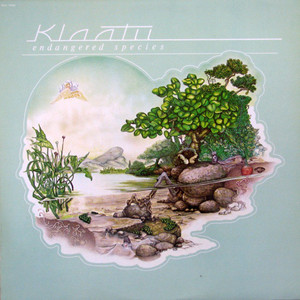
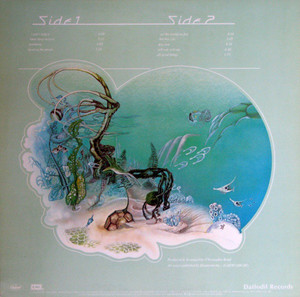
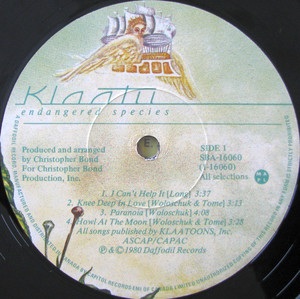
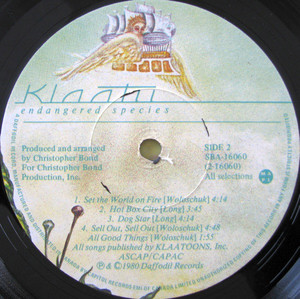
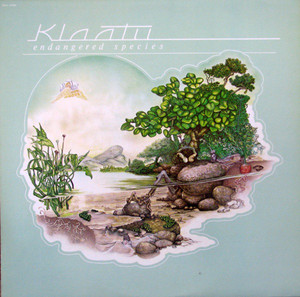
No Comments